人教版英语初中九年级上册知识讲解,巩固练习(教学资料,补习资料):Unit 3 Could you please tell me where the restrooms are? 第1课时Secti
文档属性
| 名称 | 人教版英语初中九年级上册知识讲解,巩固练习(教学资料,补习资料):Unit 3 Could you please tell me where the restrooms are? 第1课时Secti |
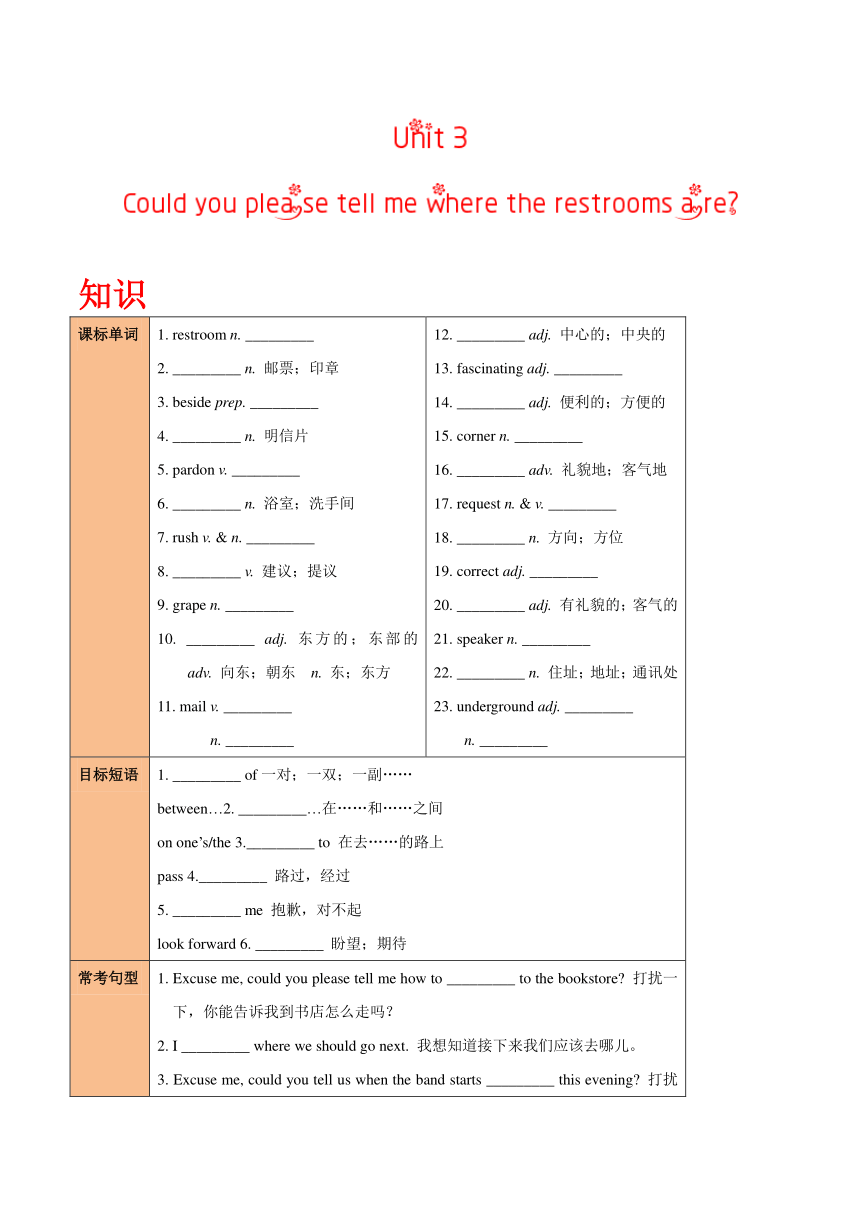
|
|
| 格式 | zip | ||
| 文件大小 | 432.8KB | ||
| 资源类型 | 教案 | ||
| 版本资源 | 人教新目标(Go for it)版 | ||
| 科目 | 英语 | ||
| 更新时间 | 2019-09-14 00:00:00 | ||
图片预览

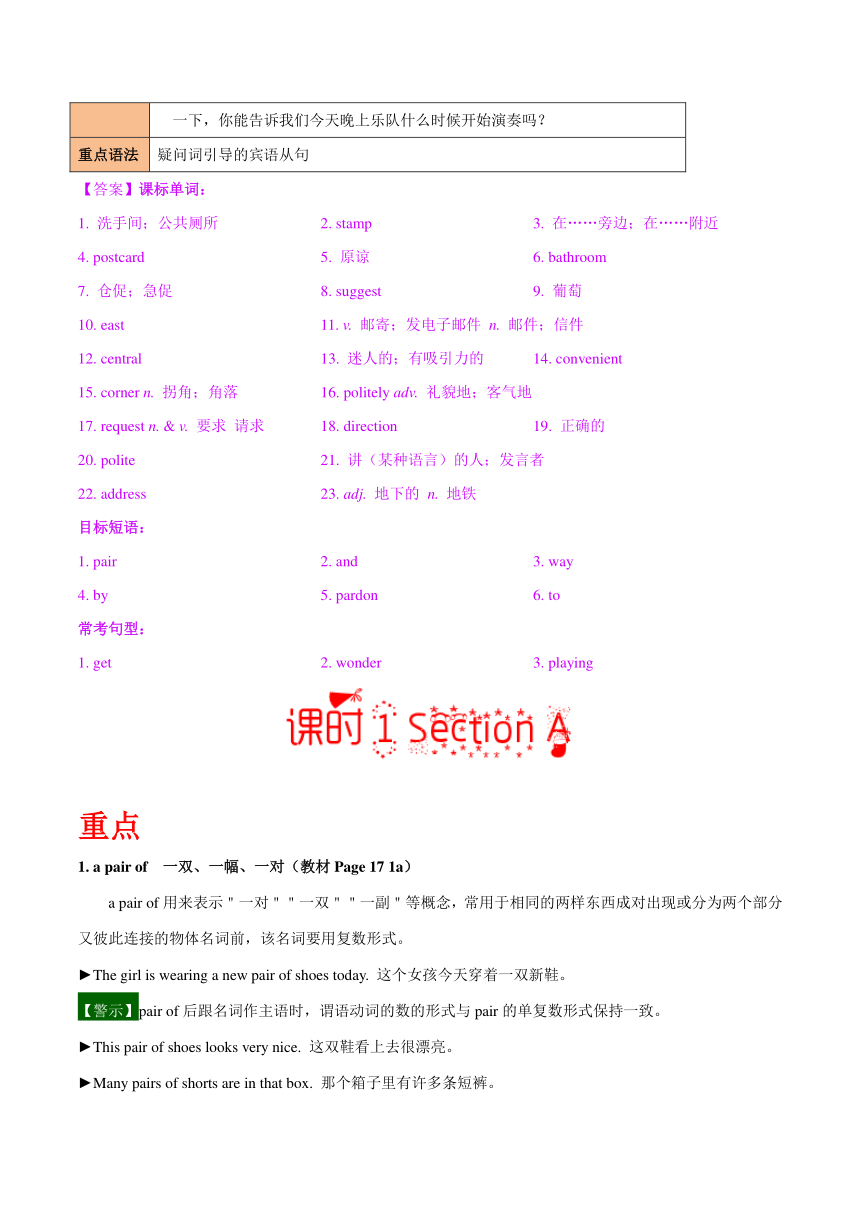
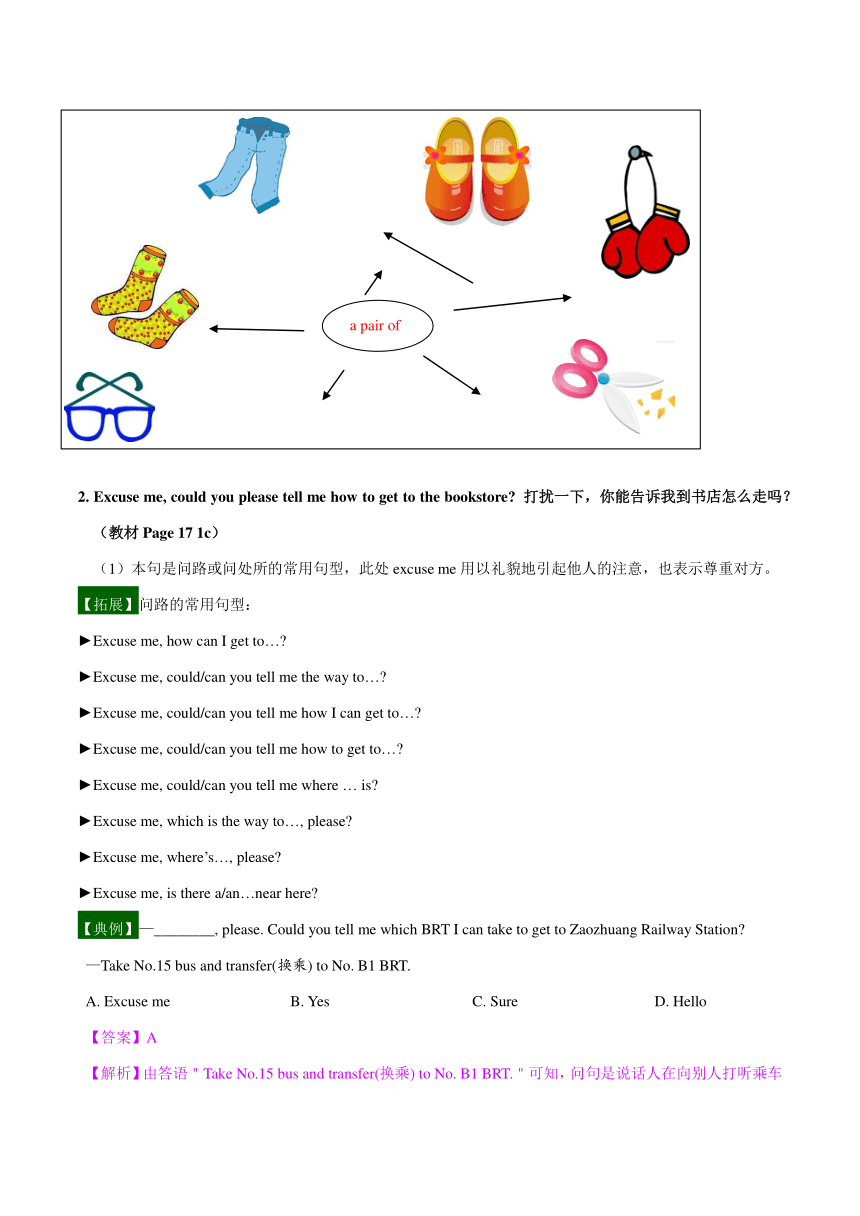
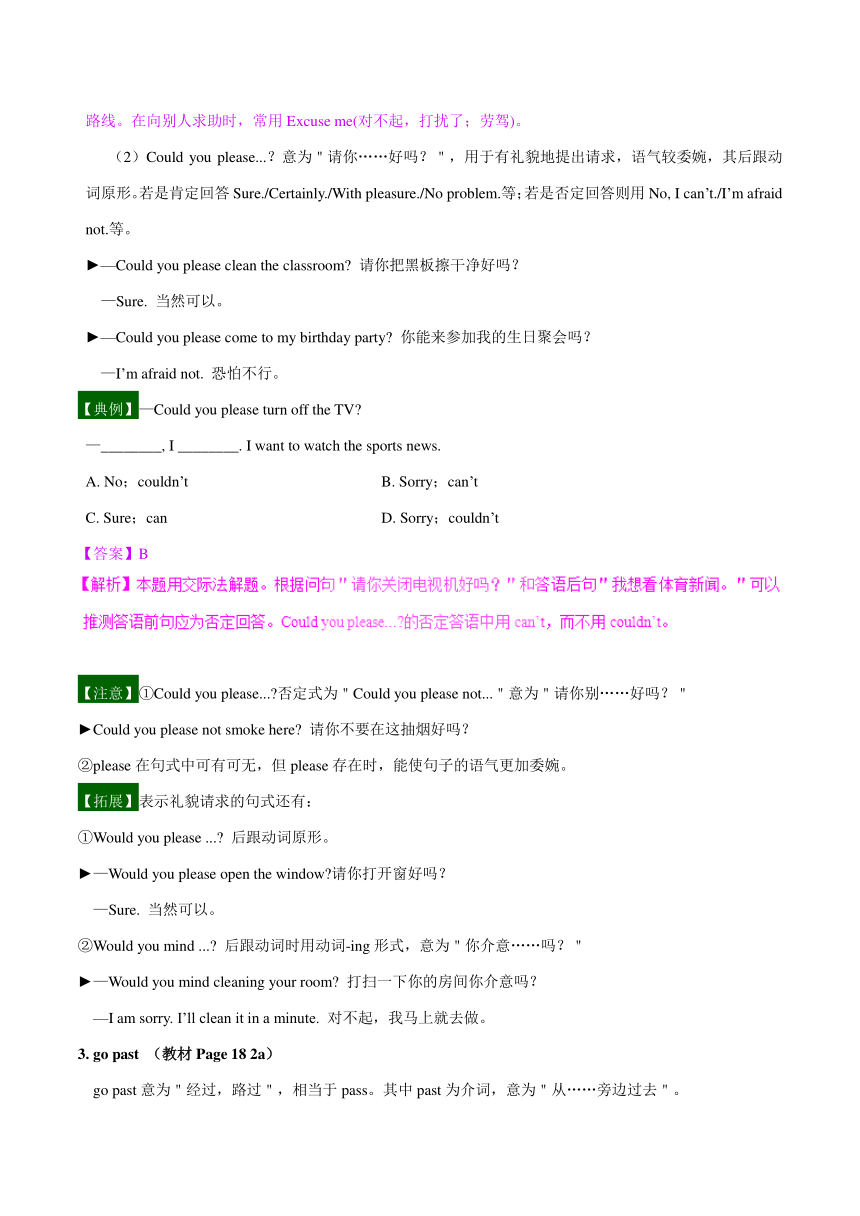
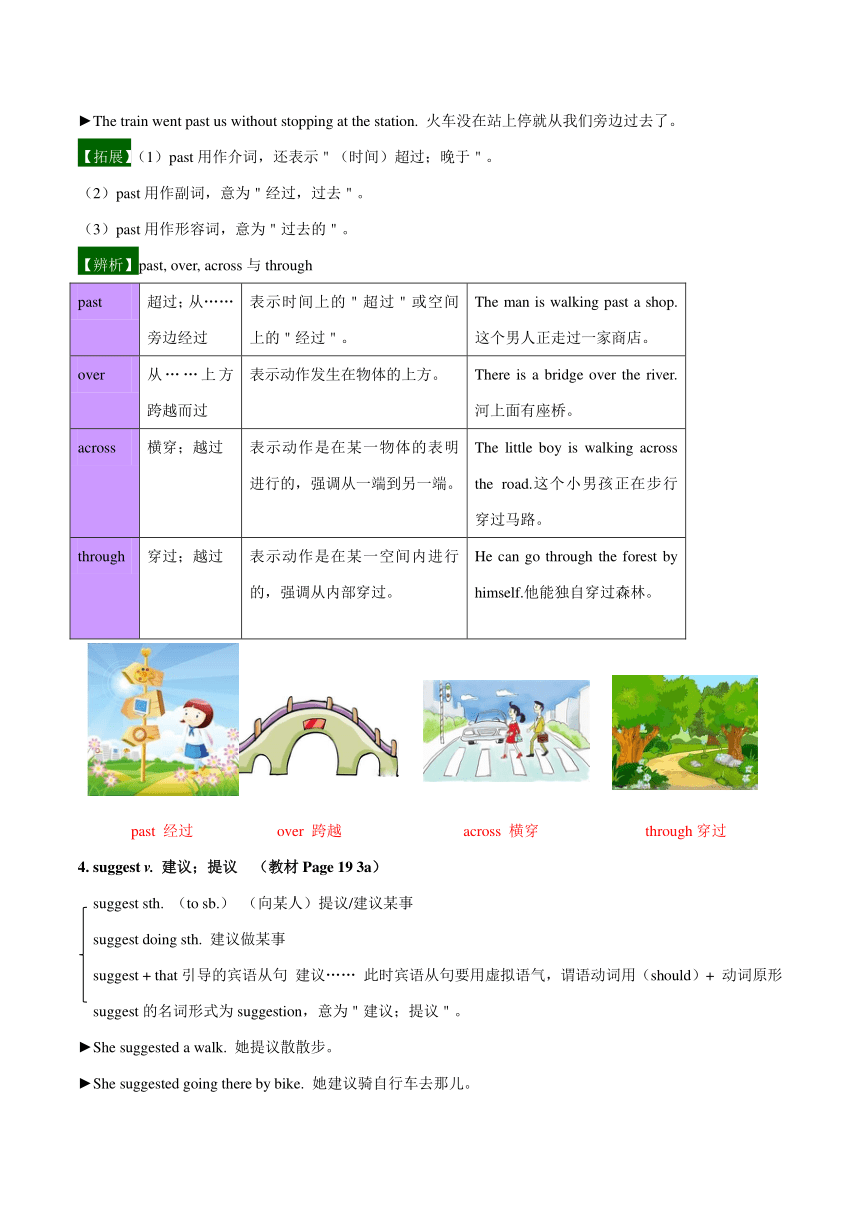
文档简介
知识
课标单词
1. restroom n. _________
2. _________ n. 邮票;印章
3. beside prep. _________
4. _________ n. 明信片
5. pardon v. _________
6. _________ n. 浴室;洗手间
7. rush v. & n. _________
8. _________ v. 建议;提议
9. grape n. _________
10. _________ adj. 东方的;东部的 adv. 向东;朝东 n. 东;东方
11. mail v. _________
n. _________
12. _________ adj. 中心的;中央的
13. fascinating adj. _________
14. _________ adj. 便利的;方便的
15. corner n. _________
16. _________ adv. 礼貌地;客气地
17. request n. & v. _________
18. _________ n. 方向;方位
19. correct adj. _________
20. _________ adj. 有礼貌的;客气的
21. speaker n. _________
22. _________ n. 住址;地址;通讯处
23. underground adj. _________
n. _________
目标短语
1. _________ of一对;一双;一副……
between…2. _________…在……和……之间
on one’s/the 3._________ to 在去……的路上
pass 4._________ 路过,经过
5. _________ me 抱歉,对不起
look forward 6. _________ 盼望;期待
常考句型
1. Excuse me, could you please tell me how to _________ to the bookstore? 打扰一下,你能告诉我到书店怎么走吗?
2. I _________ where we should go next. 我想知道接下来我们应该去哪儿。
3. Excuse me, could you tell us when the band starts _________ this evening? 打扰一下,你能告诉我们今天晚上乐队什么时候开始演奏吗?
重点语法
疑问词引导的宾语从句
【答案】课标单词:
1. 洗手间;公共厕所 2. stamp 3. 在……旁边;在……附近
4. postcard 5. 原谅 6. bathroom
7. 仓促;急促 8. suggest 9. 葡萄
10. east 11. v. 邮寄;发电子邮件 n. 邮件;信件
12. central 13. 迷人的;有吸引力的 14. convenient
15. corner n. 拐角;角落 16. politely adv. 礼貌地;客气地
17. request n. & v. 要求 请求 18. direction 19. 正确的
20. polite 21. 讲(某种语言)的人;发言者
22. address 23. adj. 地下的 n. 地铁
目标短语:
1. pair 2. and 3. way
4. by 5. pardon 6. to
常考句型:
1. get 2. wonder 3. playing
重点
1. a pair of 一双、一幅、一对(教材Page 17 1a)
a pair of用来表示"一对""一双""一副"等概念,常用于相同的两样东西成对出现或分为两个部分又彼此连接的物体名词前,该名词要用复数形式。
?The girl is wearing a new pair of shoes today. 这个女孩今天穿着一双新鞋。
【警示】pair of后跟名词作主语时,谓语动词的数的形式与pair的单复数形式保持一致。
?This pair of shoes looks very nice. 这双鞋看上去很漂亮。
?Many pairs of shorts are in that box. 那个箱子里有许多条短裤。
2. Excuse me, could you please tell me how to get to the bookstore? 打扰一下,你能告诉我到书店怎么走吗?(教材Page 17 1c)
(1)本句是问路或问处所的常用句型,此处excuse me用以礼貌地引起他人的注意,也表示尊重对方。
【拓展】问路的常用句型:
?Excuse me, how can I get to…?
?Excuse me, could/can you tell me the way to…?
?Excuse me, could/can you tell me how I can get to…?
?Excuse me, could/can you tell me how to get to…?
?Excuse me, could/can you tell me where … is?
?Excuse me, which is the way to…, please?
?Excuse me, where’s…, please?
?Excuse me, is there a/an…near here?
【典例】—________, please. Could you tell me which BRT I can take to get to Zaozhuang Railway Station?
—Take No.15 bus and transfer(换乘) to No. B1 BRT.
A. Excuse me B. Yes C. Sure D. Hello
【答案】A
【解析】由答语"Take No.15 bus and transfer(换乘) to No. B1 BRT."可知,问句是说话人在向别人打听乘车路线。在向别人求助时,常用Excuse me(对不起,打扰了;劳驾)。
(2)Could you please...?意为"请你……好吗?",用于有礼貌地提出请求,语气较委婉,其后跟动词原形。若是肯定回答Sure./Certainly./With pleasure./No problem.等;若是否定回答则用No, I can’t./I’m afraid not.等。
?—Could you please clean the classroom? 请你把黑板擦干净好吗?
—Sure. 当然可以。
?—Could you please come to my birthday party? 你能来参加我的生日聚会吗?
—I’m afraid not. 恐怕不行。
【典例】—Could you please turn off the TV?
—________, I ________. I want to watch the sports news.
A. No;couldn’t B. Sorry;can’t
C. Sure;can D. Sorry;couldn’t
【答案】B
【注意】①Could you please...?否定式为"Could you please not..."意为"请你别……好吗?"
?Could you please not smoke here? 请你不要在这抽烟好吗?
②please在句式中可有可无,但please存在时,能使句子的语气更加委婉。
【拓展】表示礼貌请求的句式还有:
①Would you please ...? 后跟动词原形。
?—Would you please open the window?请你打开窗好吗?
—Sure. 当然可以。
②Would you mind ...? 后跟动词时用动词-ing形式,意为"你介意……吗?"
?—Would you mind cleaning your room? 打扫一下你的房间你介意吗?
—I am sorry. I’ll clean it in a minute. 对不起,我马上就去做。
3. go past (教材Page 18 2a)
go past意为"经过,路过",相当于pass。其中past为介词,意为"从……旁边过去"。
?The train went past us without stopping at the station. 火车没在站上停就从我们旁边过去了。
【拓展】(1)past用作介词,还表示"(时间)超过;晚于"。
(2)past用作副词,意为"经过,过去"。
(3)past用作形容词,意为"过去的"。
【辨析】past, over, across与through
past
超过;从……旁边经过
表示时间上的"超过"或空间上的"经过"。
The man is walking past a shop.这个男人正走过一家商店。
over
从……上方跨越而过
表示动作发生在物体的上方。
There is a bridge over the river.河上面有座桥。
across
横穿;越过
表示动作是在某一物体的表明进行的,强调从一端到另一端。
The little boy is walking across the road.这个小男孩正在步行穿过马路。
through
穿过;越过
表示动作是在某一空间内进行的,强调从内部穿过。
He can go through the forest by himself.他能独自穿过森林。
past 经过 over 跨越 across 横穿 through穿过
4. suggest v. 建议;提议 (教材Page 19 3a)
suggest sth. (to sb.) (向某人)提议/建议某事
suggest doing sth. 建议做某事
suggest + that引导的宾语从句 建议…… 此时宾语从句要用虚拟语气,谓语动词用(should)+ 动词原形
suggest的名词形式为suggestion,意为"建议;提议"。
?She suggested a walk. 她提议散散步。
?She suggested going there by bike. 她建议骑自行车去那儿。
?He suggested(that)we(should)do it at once. 他建议我们立刻做这件事。
?May I make a suggestion? 我可以提个建议吗?
【典例】1. Thank you for your _________(建议). I’m sure they will be useful to my English study.
【答案】advice / suggestion
2. The old man suggests ________ back the food to these villagers.
A. give B. to give C. giving D. given
【答案】C
【解析】suggest接动词-ing形式作宾语,表示"建议做某事"。
5. on one’s way to…意为"在某人去……的路上"。 (教材Page 19 3a)
【警示】该短语后接here,there,home等地点副词时,应去掉介词to。
【拓展】常见的与way相关的短语有:
by the way顺便说一下;顺便问一下
in a way在某种程度上
lose one’s way 迷路
in the way挡路;妨碍(某人)
in this way这样;通过这种方法
【典例】—Excuse me, you are _________ of my passing through.
—I’m sorry, here you go.
A. on the way B. in the way
C. out the way D. off the way
【答案】B
6. beside /b?’sa?d/ prep. 在旁边
?I found Wendy sitting beside her mother, saying nothing. 我发现温迪坐在她妈妈旁边,什么也不说。
【辨析】beside与besides
beside
表示位置关系的介词,意为"在旁边"。
A girl is standing beside the tree. 一个女孩正站在树旁。
besides
介词,意为"除……之外还……"。
We like her besides him. 除他之外,我们还喜欢她。
【典例】In the picture, the chair is ________ the table.
A. under B. on C. above D. beside
【答案】D
7. between...and... 在……和……之间
?I’ll phone you between 9:00 a. m. and 10:00 a. m. 我将在上午九点至十点间给你打电话。
between...and...意为"在……和……之间",只能用于两者之间。
?There is a chair between the bed and the table. 在床和桌子之间有一把椅子。
【辨析】anyone与someone这两个词都有"在……之间"的意思,但用法不同:
between
在……之间(指二者)
among
在……之间(指三者或三者以上)
?The letter B is between A and C. 字母B在A和C之间。
?The village lies among the mountains. 这个村庄位于群山之中。
【典例】The bank is ________ the bookstore and the post office.
A. at the front of B. among C. between
【答案】C
【解析】考查介词辨析。at the front of"在……前部";among"在……中间",指三者或三者以上之间;between"在……之间",常和and连用,指两者之间。句意:银行在书店和邮局之间。
8. pardon v. 原谅
pardon可用作动词,意为"原谅",接宾语时可以用双宾语的形式。pardon sb. for (doing) sth.意为"原谅/宽恕某人做某事"。
?We must pardon him for his fault. 我们一定要原谅他的过失。
?Can you pardon me for not passing the exam, Mom? 妈妈,您能原谅我考试没及格吗?
9. rush /r??/ v. & n.仓促;急促
(1)rush 可以作不及物动词,意为"迅速行动;急促"。
?Don’t rush. We have plenty of time. 别急。我们有充裕的时间。
?He rushed into the room. 他冲进了房间。
?Linda rushed to hand in her papers. 琳达仓促地交上了试卷。
(2)rush用作名词,意为"匆忙;繁忙"。常用短语:in a rush"仓促",rush hour"(交通)高峰期;拥挤时刻"。
?She was always in a rush. 她老是匆匆忙忙的。
?If you go now, you’re likely to hit the rush hour. 你要是现在走,很有可能会赶上交通高峰期。
基础训练
Ⅰ.单词拼写。
1. Mr Wang is going to give us a __________ (演讲) next Friday afternoon.
2. He usually spends a lot of time __________(看) newspapers.
3. I need someone __________ (share) my worries with.
4. We’re looking forward to a holiday __________(没有) homework so that we can relax ourselves.
5. There’s no __________ (怀疑) that they will win.
6. He has won high __________ (赞扬) from the country.
7. I don’t know __________(是否) it is going to rain or not.
8. Think it over before you make a __________ (decide).
9. Mum allows me __________ (listen) to my problems and giving me so much advice.
10. I beg your p__________; what did you mean?
11. There is a bank b__________ the supermarket.
12. Jim is taking a shower in the b__________.
13. How many __________ (stamp) do you want to buy?
14. I forgot __________ (mail) the letter to him. I will do it at once.
15. When do you __________ (normal) get home from work?
II. 用方框中所给单词或短语的适当形式填空。
such as ask about lead in parking lot look forward to
1. People in the west don’t like to __________ ladies’ ages.
2. I am interested in many Hollywood animations (卡通影片), __________ Up and Frozen.
3. It’s a pity that we will not go to Fun Times Park. We have been __________ the visit for weeks.
4. There is not a __________ near the cinema, so we’d better take a bus instead of driving there.
5. By __________ to a request with a question, you can make others feel more comfortable.
III. 同义句转换。
1. She went past me when I sat on the ground in the park.
She ________ ________ me when I sat on the ground in the park.
2. I don’t know what I shall do next.
I don’t know ________ ________ ________ next.
3. Excuse me. Can you tell me where I can park the car?
________ ________. Can you tell me where I can park the car?
4. Could you please tell me whether there is a post office nearby?
Could you please tell me ________ there is a post office nearby?
IV. 单项选择。
1. We all know that learning a foreign language ________ time and effort.
A. requires B. reduces C. removes D. repeats
2. Thank you for your ________. They are of great ________ to me.
A. advice; value B. suggestions; value
C. suggestions; valuable D. advice; valuable
3.—Call me up if it’s ________ to you tonight.
—Sure.
A. nice B. convenient C. uncrowded D. organized
4.—________, could you tell me the way to the Park Street?
—The Park Street? Oh, go straight and turn left.You can’t miss it.
A. All right B. Never mind C. Excuse me D. Thank you
能力提高
I. 完形填空。
Most of us have three meals a day.We take food for granted(想当然). And we don’t think about it. 1 experts argue a food crisis(危机) is coming.This crisis is going to make us 2 the way we think about food.
Food is in great need 3 a growing of world population.By 1960, the population was three billion. It doubled to six billion by 1999. By 2050, this planet will need to 4 at least nine billion people.As a result, the food prices get higher and higher.
So, what can a 5 , crowed world do? One suggestion is to eat 6 meat.Meat uses more natural resources(资源) than grains(谷物). It requires more 7 to produce one pound of meat than to produce one pound of grain. It also requires between 5 and 10 times more 8 than vegetables. So, eating less meat will 9 more land for farming, and it will save water.
To eat less meat, people will need to change their eating habits.That will not be 10 . Americans, for example, have 11 loved meat.In general, they eat twice as much meat as people in other countries.At the same time, in developing countries like China and Brazil, sales of meat have doubled in the last 20 years. 12 will double again by 2050.Growing need of meat will 13 to put pressure on natural resources.
World population is increasing, resources are becoming fewer, and food prices are rising.Therefore, we need to rethink 14 we eat every day. For meat lovers, we don’t need to give up meat 15 . But we need to eat more grains and less meat.
1. A. And B. But C. Or D. Until
2. A. change B. find C. get D. tell
3. A. instead of B. thanks to C. because of D. as for
4. A. help B. have C. feed D. meet
5. A. busy B. tired C. thirsty D. hungry
6. A. less B. more C. much D. little
7. A. time B. land C. people D. place
8. A. air B. meat C. money D. water
9. A. provide B. produce C. waste D. need
10. A. important B. hard C. easy D. necessary
11. A. never B. seldom C. hardly D. always
12. A. It B. They C. We D. That
13. A. continue B. stop C. have D. start
14. A. how B. when C. what D. where
15. A. quickly B. completely C. finally D. especially
II. 阅读理解。
A
The police find most criminals(罪犯) because somebody tells them who the criminals are. They find other criminals by using science and their computers.When there is a bank robbery(抢劫), the police first look through their computers for the names of the bank robbers that they know about. Then they go and talk to any of these robbers who are not in prison(监狱). They ask them where they were when the robbery happened. If any of these people cannot give a good answer, the police will often use science to find out if one of them is the robber.
Many criminals leave something of themselves at the places of the crimes like a fingerprint or a hair. Or they take something away on their shoes or clothes, like dirt or animal hair. If they leave behind some of their blood or their hair or a piece of skin, it will have their DNA inside it.
Everyone’s DNA is different and their fingerprints are also different. So, if a criminal cuts himself during a robbery or leaves his hair, or even a small piece of skin, scientists can find out what his DNA is. The police can then ask the person they think is the robber to give them his hair or some blood and see if it has the same DNA. Many criminals are in prison today because of this kind of evidences.
根据短文内容判断正(T)误(F)。
1. Usually the police find criminals because they use their computers.
2. The police do not usually ask criminals who are in prison about a crime because these criminals could not have done it.
3. The most useful evidences that criminals leave at the places of their crimes are things with their DNA in them.
4. Many criminals usually take something away only on their shoes after the crimes.
5. The story is about a bank robbery.
B
Table manners from different cultures are totally different. Here are some interesting table manners in different countries.
In Spain, you’re supposed to use your bread as another piece of cutlery(餐具). Spanish people often hold a fork in their right hand, and a small piece of bread in their left hand, which is then used to help push food gently onto the fork.
In Brazil, you should wipe your mouth with your napkin(餐巾) every time you take a drink.
In Russia, you’re not supposed to look into another one’s plate. It’s polite to leave a little food at the end of the meal.
In Chile(智利), dishes should be served from the left and taken away from the right.
In India, you should use the right hand to take food and use the left hand to pass dishes. South Indian meals are served on a banana leaf that has been cleaned with warm water.
In the US and Canada, gentlemen should stand behind their chairs until women are seated. Before asking for additional servings, you should finish the serving on your plate.
6. In Spain, you should push food onto your fork with ________.
A. the spoon in your left hand B. the spoon in your right hand
C. the bread in your left hand D. the bread in your right hand
7. You shouldn’t ________ in Russia.
A. stand behind your chair B. look into other people’s plates
C. wipe your mouth with your napkin D. leave any food on your plate
8. In ________, people should take away dishes from the right.
A. Spain B. Chile C. America D. Canada
9. People use ________ to take food in India.
A. forks B. napkin C. the left hand D. the right hand
10. In South India, people put food ________.
A. in a bowl with warm water B. in a pot with warm water
C. on a clean banana leaf D. on a clean plate
C(2018 ? 江苏江阴市华士实验中学九年级上第一次月考)
His talent and charm have made him the No. 1 Chinese classical artist in the world. And he played in the grand Beijing Olympic opening ceremony in 2008, watched by a TV audience of 5 billion.
Lang Lang, 26, is the first Chinese pianist to play with the world’s top orchestras(管弦乐队),making his first appearance at the Carnegie Hall in New York at 18, while still a student.
Lang’s charm and fondness make him a natural fit to represent China’s new international image. According to the British newspaper the Times, "The Lang Lang effect" drives 36 million Chinese children to learn the piano.
Now in China, children are learning Chopin and Western orchestras are playing sold-out tours across Chinese cities. But can China ever introduce its own music to the West? Lang is trying. His cooperation(合作)with the London Symphony Orchestra this month includes a performance of Dragon Songs, an album of traditional Chinese classics.
Behind the success, however, is a surprising story of a gifted child. Lang grew up with his father’s own musical ambition(抱负) and high expectations. It is not hard to imagine how boring it must be to practice the piano every day. Lang said that he once hated his hands and the piano. He got his right hand hurt six years ago and had to rest. "That was the best month," he says.
11. What is the main reason why Lang Lang is the No.1 Chinese classical artist in the world?
A. He played in the Beijing Olympic opening ceremony in 2008.
B. He usually plays with the world’s top orchestras.
C. He tries to introduce Chinese music to Western countries.
D. He plays the piano so well and has a good international image.
12. Lang Lang is trying his best to _________ now.
A. introduce China’s own music to the West
B. play sold-out tours across Chinese cities
C. encourage children to learn the piano
D. prepare for a performance of Dragon songs
13. Which of the following about Lang Lang is true?
A. He didn’t like music at all.
B. He had a good rest and enjoyed himself because he got his right hand hurt.
C. He has had a great musical ambition since his childhood.
D. He first appeared in the Beijing Olympic Games in 2008.
14. From the last paragraph we can learn _________.
A. Lang didn’t like playing the piano at all as a child
B. He was happy to practice the piano every day
C. His father’s wish and expectations played an important role in his childhood
D. He hurt his hands six years ago
真题练习
1.(2018 ? 江苏连云港卷)—It’s useful for the deaf people to learn sign language.
—Yes, it’s a major way of ________ for them.
A. suggestion B. vacation C. production D. communication
2.(2019 ? 湖北襄阳卷)—Look! So many colorful bicycles in two lines over there.
—They’re for public. This ________ of green smart traffic is everywhere in Xiangyang city.
A. number B. pair C. kind D. piece
3.(2019 ? 山东东营卷)Stephen Hawking got more than 380, 000 followers in two hours ________ first message on Weibo.
A. before B. since C. after D. until
4. (2018年安徽省中考)The speaker showed some ______ examples to make the science report easy to understand.
A. awful B. stupid C. proper D. thick
5. (2018 山东东营卷)_________ running after success, we have a lot of other interesting things to do in our lives.
A. By B. On C. Besides D. Except
6. (2019 ? 山东菏泽中考)Please e-mail me ________ sdshzs666@163.com if you have any questions.
A. on B. at C. to
7. (云南省2019 年中考)We can _______ some information about this city on the Internet.
A. look up B. look like C. look after D. look forward to
8. (内蒙古包头市2019年中考)Terry, _______ from your cell phone when your father is talking to you.
A. look up B. look around C. look down D. look out
9. (2018年贵州省安顺市中考)I think young phubbers(低头族)are supposed to the time they spend their smart phones.
A. cut off;in B. cut down;on C. cut up;on D. cut in;in
10. (湖北省宣昌市2018年中考)—In the past five years, China has played an important role in the Belt and Road.
—It has__________ many nations a great chance to communicate.
A. offered B. supported C. included D. directed
参考答案
基础训练
I. 单词拼写。
1. speech 2. reading 3. to share
4. without 5. doubt 6. praise
7. whether 8. decision 9. to listen
10.pardon 11. beside 12. bathroom
13. stamps 14. to mail 15. normally
II. 用方框中所给单词或短语的适当形式填空。
1. ask about 2. such as 3. looking forward to 4. parking lot 5. leading in
III. 同义句转换。
1. passed by 2. what to do 3. Pardon me 4. if
IV. 单项选择。
2. B【解析】句意:非常感谢你的建议,它们对于我来说很有价值。此题考查名词和固定短语be of value to sb.对某人有价值。根据句意可知选B。
3. B【解析】nice漂亮的;convenient方便的;uncrowded不拥挤的;organized有组织的。句意:——如果今晚你方便,给我打个电话吧。——好的。
4. C【解析】本题考查情景交际。西方人出于礼貌,在问别人话之前先说Excuse me"打扰了",故选C。
能力提高
I. 完形填空。
1. B【解析】考查连词的用法。空格前的"And we don’t think about it."与空格后的"experts argue a food crisis(危机) is coming"之间是转折关系。but意为"但是",表示转折关系,符合文意。故选B。
2. A【解析】考查动词辨析。change意为"改变";find意为"找到";get意为"得到";tell意为"告诉"。句意为:这场危机将会改变我们对食物的认识。故选A。
3. C【解析】考查介词短语辨析。instead of意为"代替,而不是";thanks to意为"幸亏,由于";because of意为"因为";as for意为"至于"。空格前的"Food is in great need"和空格后的"a growing of world population"之间构成因果关系,即因为世界人口增长,所以对食物的需求量非常大。故选C。
4. C【解析】考查动词辨析。help意为"帮助";have意为"有";feed意为"喂养,向……提供";meet意为"见面"。由下文"As a result,the food prices get higher and higher."可知,到2050年,地球将需要为至少90亿人提供食物。故选C。
6. A【解析】考查形容词的比较级。由下文"Meat uses more natural resources(资源) than grains(谷物). "可知,此处指有一个建议就是少吃肉。less意为"更少的",符合文意。故选A。
7. B【解析】考查名词辨析。time意为"时间";land意为"土地";people意为"人";place意为"地方"。由下文"eating less meat will ________(44) more land for farming"可知,此处指生产一磅肉比生产一磅谷物需要的土地多。故选B。
8. D【解析】考查名词辨析。air意为"空气";meat意为"肉";money意为"钱";water意为"水"。由下文"it will save water"可知,生产同等重量的肉和蔬菜,肉所需要的水是蔬菜所需水的5到10倍。故选D。
9. A【解析】考查动词辨析。provide意为"提供";produce意为"生产";waste意为"浪费";need意为"需要"。句意为:因此,少吃肉将会为农业生产提供更多的土地,并且会节约水资源。provide...for意为"为……提供",符合文意。故选A。
10. C【解析】考查形容词辨析。important意为"重要的";hard意为"难的";easy意为"容易的";necessary意为"必要的"。由下文所举的"美国人爱吃肉"的例子可知,此处指改变人们的饮食习惯并不容易。故选C。
12. B【解析】考查代词的用法。由上文"sales of meat have doubled in the last 20 years"可知,空格处代指"sales of meat",表示复数概念,应用they。故选B。
13. A【解析】考查动词辨析。continue意为"继续";stop意为"停止";have意为"有";start意为"开始"。句意为:对肉类需求的增长会继续给自然资源增加压力。故选A。
14. C【解析】考查宾语从句的引导词辨析。分析句子结构可知,空格处引导宾语从句,在从句中作"eat"的宾语,应用what。句意为:因此,我们需要重新考虑我们每天吃的东西。故选C。
15. B【解析】考查副词辨析。quickly意为"迅速地";completely意为"完全地";finally意为"最终地";especially意为"尤其"。由下文"But we need to eat more grains and less meat."可知,此处指对于喜欢吃肉的人来说,我们不必完全放弃吃肉,而是要多吃谷物少吃肉。故选B。
II. 阅读理解。
A
1. F【解析】根据第一段第一句"The police find most criminals(罪犯) because somebody tells them who the criminals are."可知答案。
2. T【解析】根据第一段中"When there is a bank robbery(抢劫), the police first look through their computers for the names of the bank robbers that they know about."可知答案。
3. T【解析】根据第三段中"Everyone’s DNA is different..."可知答案。
4. F【解析】根据第二段中"Or they take something away on their shoes or clothes, like dirt or animal hair."可知答案。
5. F【解析】通读全文可知这是关于警察如何破案的短文。
B
6.C【解析】细节理解题。由第二段中的"...and a small piece of bread in their left hand,which is then used to help push food gently onto the fork."可知答案。
7. B【解析】细节理解题。由第四段第一句"In Russia, you’re not supposed to look into another one’s plate."可知答案。
8. B【解析】细节理解题。由第五段"In Chile(智利), dishes should be...taken away from the right."可知答案。
9. D【解析】细节理解题。由第六段第一句"In India,you should use the right hand to take food..."可知,在印度,人们用右手取食物。
10. C【解析】细节理解题。由第六段最后一句"...on a banana leaf that has been cleaned..."可知答案。
C
文章大意:本文介绍了中国首席古典艺术家—朗朗。朗朗在父亲的期望下经过勤奋努力终于取得了世人瞩目的成就,成了首位和世界顶级乐团同台演出的中国人。英国时报报道"朗朗效应"是造成三千六百万中国儿童学习钢琴的原因。而如今朗朗正在尝试着把中国的音乐推出国门,走向世界。
13. B【解析】细节理解题。根据第五段末He got his right hand hurt six years ago and had to rest. "That was the best month," he says可知六年前朗朗的右手受伤,他不得不休息,所以选B。
14. C【解析】推理判断题。根据文章末段Lang grew up with his father’s own musical ambition and high expectations可以判断朗朗是在父亲的期望和监督下才取得了如今的成就,所以选C。
真题练习
1. D【解析】句意:——对于聋哑人学手语是有用的。——是的,对于他们来说主要的方式是交流。suggestion建议;vacation假期;production成果,产品;communication交流,通讯。根据常识可知学习手语的目的是交流,故选D。
2. C【解析】句意:——看!有这么多五颜六色的自行车在那边排成了两条线。——他们是公用的。这种绿色智能交通在襄阳市到处都是。number数量;pair对,双;kind 种类;piece片,张,块。结合语境,故选C。
3. C【解析】句意:史蒂芬霍金在微博上的第一个消息发出后,两小时内获得了380,000多位跟贴。before在……之前;since自从;after在……之后;until直到……。微博发出后有380,000多位跟贴。故选C。
4. C【解析】句意:演讲者举了一些合适的例子来使科学报告更容易理解。A. awful不舒服的,极坏的,可怕的; B. stupid愚蠢的;C. proper合适的,恰当的;D. thick厚的。根据make the science report easy to understand.可知是合适的例子;故选C。
6. B【解析】考查介词辨析。句意:如果你有任何问题,请给我发邮件到sdshzs666@163.com。给某人发邮件:email sb at…。故选B。
7. A【解析】句意:我们可以在网上查询有关这个城市的一些信息。本题考查动词短语。A. look up查询,查找;B. look like看上去像;C. look after照顾;D. look forward to盼望。根据句意可知选A。
8. A【解析】考查动词短语。句意:Terry,当你爸爸和你说话的时候,请将头从手机上抬起来。A. look up向上看;B. look around环顾四周;C. look down向下看;D. look out 根据上下文语境可知当爸爸和你说话的时候要注视对方,表示尊敬,即抬起头(将目光从手机上移开,不要总是低头看手机,这是不礼貌的),结合选项,可知A选项符合题意,look up from意思是"从……抬头看",故答案选A。
9. B【解析】句意:我认为年轻的低头族应该减少他们在智能手机上的时间。cut off切除;cut down减少; cut up切碎;cut in插嘴,干预。结合句意可知,句子第一个设空处中缺少"缩短"一词, spend time on sth. 在某事上花费时间,故答案为B。
10. A【解析】句意:——近五年来,中国在"一带一路"中发挥了重要作用。——它为许多国家提供了交流的好机会。考查动词辨析题。A. offered提供;B. supported支持;C. included包括;D. directed指导。a great chance to communicate交流的好机会;根据句意语境,可知offer符合句意,故选A。
同课章节目录
- Unit 1 How can we become good learners.
- Section A
- Section B
- Unit 2 I think that mooncakes are delicious!
- Section A
- Section B
- Unit 3 Could you please tell me where the restroom
- Section A
- Section B
- Unit 4 I used to be afraid of the dark.
- Section A
- Section B
- Unit 5 What are the shirts made of?
- Section A
- Section B
- Review of Units 1-5
- Unit 6 When was it invented?
- Section A
- Section B
- Unit 7 Teenagers should be allowed to choose their
- Section A
- Section B
- Unit 8 It must belong to Carla.
- Section A
- Section B
- Unit 9 I like music that I can dance to.
- Section A
- Section B
- Unit 10 You're supposed to shake hands.
- Section A
- Section B
- Review of Units 6-10
- Unit 11 Sad movies make me cry.
- Section A
- Section B
- Unit 12 Life is full of the unexpected
- Section A
- Section B
- Unit 13 We're trying to save the earth!
- Section A
- Section B
- Unit 14 I remember meeting all of you in Grade 7.
- Section A
- Section B
- Review of Units 11-14
